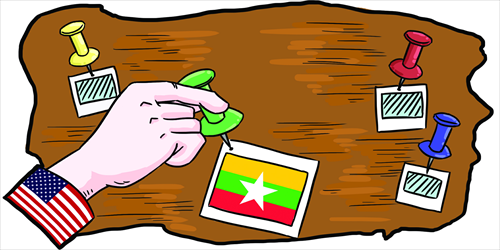US hopes for economic kick start in reformed Myanmar

The arrival of Derek Mitchell in Myanmar as the first US ambassador to the country in 22 years anchors a new page in US-Myanmar relations. It is the ultimate manifestation of the US recognition and affirmation of the democratic reforms adopted by Myanmar President Thein Sein. Complementing Mitchell's arrival was Washington's expected announcement on the implementation of easing the financial sanctions on Myanmar, a move that has been fervently lobbied for and anxiously awaited by eager US companies for months.
The announcement disappoints many but surprises few. After all, it is merely the finalization and materialization of the announced easing of sanctions in May after the April by-elections. In Washington's views, the by-election and the land-slide victory of Aung San Suu Kyi and her National League of Democracy were highly satisfactory, reconfirming Thein Sein's unswerving commitment to democracy.
Followed by the resignation of hardliner Vice President Tin Aung Myint Oo, It clears Washington's concerns that the reform process in Myanmar might be reversed by the conservatives. After months of careful observation and calibration, the US has gradually concluded that the initial stage of political reform in Myanmar has been successful and a major pushback by the military or conservatives seems unlikely.
Following the established "action-for-action" formula, the US has to honor the recognized democratic reforms and deliver the promised rewards. The US restored bilateral relations to the ambassadorial level and formally eased the financial sanctions. Both are aimed at strengthening the legitimacy and capacity of the Thein Sein government at home and abroad.
Doubts remain, especially among the democratic opposition and human rights groups. The primary concern is that state-owned companies in Myanmar lack transparency and accountability and opening the door of investment to them is a risky, slippery slope. As recent as last month, Suu Kyi openly advised against easing sanctions, especially those on investment in the state-run Myanmar Oil and Gas Enterprise.
Washington's move therefore marks a rare public show of difference between Suu Kyi and the US. As the preeminent democratic icon, Suu Kyi has by and large for the past two decades determined the course of US policy toward Myanmar. Her influence has been so absolute that many see Washington as being "kidnapped" by her agenda.
But now as the country opens up and the bilateral relations are restored, diversify and thrive, her dominance has begun to falter. After all, the ultimate goal of the US is a democratic and prosperous Myanmar and a healthy US-Myanmar relationship, among and above anything and anyone else.
Enticed by the rich natural resources and business potentials of Myanmar, US companies, especially energy firms, have played a large role in lobbying for and pushing through the ease of sanctions last week. Their European and Asian counterparts were freed from the leash much earlier, and there is no reason why American companies should be lagged behind.
However, Washington's decision goes deeper than superficial commercial interests. The US understands perfectly that although the Thein Sein government is on the right track for political reform, the tasks ahead are daunting. After the initial success against the conservatives, the reformers now have to deliver to the Myanmar people what they have promised and prove to them that democracy does bring economic benefits and a better life. This is not only for the legitimacy of the reform, but also for the legitimacy of the Thein Sein government and the democratic model the US wishes to set up.
These are no easy tasks for any country, let alone Myanmar that lacks the knowledge base, capacity, human resources, infrastructure, legal framework, and every other element needed. Furthermore, as Myanmar tests the water with the new democratic system, the democratic procedures themselves need time to work out issues such as the lack of consensus, prolonged debates, political compromises and delayed and occasionally unsatisfactory decisions. How to help the government tackle these deficiencies has become the top priority for Washington.
The hope for business-led capacity building is high, especially considering Washington's financial constraints on foreign aid. American businesses are tasked with special missions beyond their usual commercial aspirations. Most basically, it is hoped that they will bring the badly-needed investment and business opportunities to jumpstart Myanmar's economy based on its rich natural and cheap labor resources.
At the same time, US private companies will also offer training, education and skills to the local population, and hopefully promote better environmental and social practice to set a high standard and a good model from the very beginning. For the time being, the goals of Washington and private companies converge. Supporters and accusers of the strategy await to see its result.
The author is a foreign policy analyst based in Washington. opinion@globaltimes.comcn